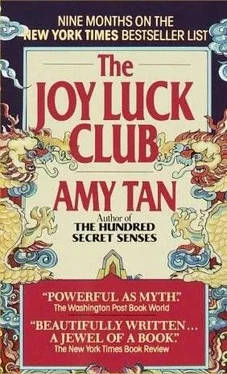When I was eight, I had played with a crab my mother had brought home for my birthday dinner. I had poked it, and jumped back every time its claws reached out. And I determined that the crab and I had come to a great understanding when it finally heaved itself up and walked clear across the counter. But before I could even decide what to name my new pet, my mother had dropped it into a pot of cold water and placed it on the tall stove. I had watched with growing dread, as the water heated up and the pot began to clatter with this crab trying to tap his way out of his own hot soup. To this day, I remember that crab screaming as he thrust one bright red claw out over the side of the bubbling pot. It must have been my own voice, because now I know, of course, that crabs have no vocal cords. And I also try to convince myself that they don't have enough brains to know the difference between a hot bath and a slow death.
For our New Year celebration, my mother had invited her longtime friends Lindo and Tin Jong. Without even asking, my mother knew that meant including the Jongs' children: their son Vincent, who was thirty-eight years old and still living at home, and their daughter, Waverly, who was around my age. Vincent called to see if he could also bring his girlfriend, Lisa Lum. Waverly said she would bring her new fiancé, Rich Schields, who, like Waverly, was a tax attorney at Price Waterhouse. And she added that Shoshana, her four-year-old daughter from a previous marriage, wanted to know if my parents had a VCR so she could watch Pinocchio , just in case she got bored. My mother also reminded me to invite Mr. Chong, my old piano teacher, who still lived three blocks away at our old apartment.
Including my mother, father, and me, that made eleven people. But my mother had counted only ten, because to her way of thinking Shoshana was just a child and didn't count, at least not as far as crabs were concerned. She hadn't considered that Waverly might not think the same way.
When the platter of steaming crabs was passed around, Waverly was first and she picked the best crab, the brightest, the plumpest, and put it on her daughter's plate. And then she picked the next best for Rich and another good one for herself. And because she had learned this skill, of choosing the best, from her mother, it was only natural that her mother knew how to pick the next-best ones for her husband, her son, his girlfriend, and herself. And my mother, of course, considered the four remaining crabs and gave the one that looked the best to Old Chong, because he was nearly ninety and deserved that kind of respect, and then she picked another good one for my father. That left two on the platter: a large crab with a faded orange color, and number eleven, which had the torn-off leg.
My mother shook the platter in front of me. "Take it, already cold," said my mother.
I was not too fond of crab, every since I saw my birthday crab boiled alive, but I knew I could not refuse. That's the way Chinese mothers show they love their children, not through hugs and kisses but with stern offerings of steamed dumplings, duck's gizzards, and crab.
I thought I was doing the right thing, taking the crab with the missing leg. But my mother cried, "No! No! Big one, you eat it. I cannot finish."
I remember the hungry sounds everybody else was making-cracking the shells, sucking the crab meat out, scraping out tidbits with the ends of chopsticks-and my mother's quiet plate. I was the only one who noticed her prying open the shell, sniffing the crab's body and then getting up to go to the kitchen, plate in hand. She returned, without the crab, but with more bowls of soy sauce, ginger, and scallions.
And then as stomachs filled, everybody started talking at once.
"Suyuan!" called Auntie Lindo to my mother. "Why you wear that color?" Auntie Lindo gestured with a crab leg to my mother's red sweater.
"How can you wear this color anymore? Too young!" she scolded.
My mother acted as though this were a compliment. "Emporium Capwell," she said. "Nineteen dollar. Cheaper than knit it myself."
Auntie Lindo nodded her head, as if the color were worth this price. And then she pointed her crab leg toward her future son-in-law, Rich, and said, "See how this one doesn't know how to eat Chinese food."
"Crab isn't Chinese," said Waverly in her complaining voice. It was amazing how Waverly still sounded the way she did twenty-five years ago, when we were ten and she had announced to me in that same voice, "You aren't a genius like me."
Auntie Lindo looked at her daughter with exasperation. "How do you know what is Chinese, what is not Chinese?" And then she turned to Rich and said with much authority, "Why you are not eating the best part?"
And I saw Rich smiling back, with amusement, and not humility, showing in his face. He had the same coloring as the crab on his plate: reddish hair, pale cream skin, and large dots of orange freckles. While he smirked, Auntie Lindo demonstrated the proper technique, poking her chopstick into the orange spongy part: "You have to dig in here, get this out. The brain is most tastiest, you try."
Waverly and Rich grimaced at each other, united in disgust. I heard Vincent and Lisa whisper to each other, "Gross," and then they snickered too.
Uncle Tin started laughing to himself, to let us know he also had a private joke. Judging by his preamble of snorts and leg slaps, I figured he must have practiced this joke many times: "I tell my daughter, Hey, why be poor? Marry rich!" He laughed loudly and then nudged Lisa, who was sitting next to him, "Hey, don't you get it? Look what happen. She gonna marry this guy here. Rich. 'Cause I tell her to, marry Rich ."
"When are you guys getting married?" asked Vincent.
"I should ask you the same thing," said Waverly. Lisa looked embarrassed when Vincent ignored the question.
"Mom, I don't like crab!" whined Shoshana.
"Nice haircut," Waverly said to me from across the table.
"Thanks, David always does a great job."
"You mean you still go to that guy on Howard Street?" Waverly asked, arching one eyebrow. "Aren't you afraid?"
I could sense the danger, but I said it anyway: "What do you mean, afraid? He's always very good."
"I mean, he is gay," Waverly said. "He could have AIDS. And he is cutting your hair, which is like cutting a living tissue. Maybe I'm being paranoid, being a mother, but you just can't be too safe these days…"
And I sat there feeling as if my hair were coated with disease.
"You should go see my guy," said Waverly. "Mr. Rory. He does fabulous work, although he probably charges more than you're used to."
I felt like screaming. She could be so sneaky with her insults. Every time I asked her the simplest of tax questions, for example, she could turn the conversation around and make it seem as if I were too cheap to pay for her legal advice.
She'd say things like, "I really don't like to talk about important tax matters except in my office. I mean, what if you say something casual over lunch and I give you some casual advice. And then you follow it, and it's wrong because you didn't give me the full information. I'd feel terrible. And you would too, wouldn't you?"
At that crab dinner, I was so mad about what she said about my hair that I wanted to embarrass her, to reveal in front of everybody how petty she was. So I decided to confront her about the free-lance work I'd done for her firm, eight pages of brochure copy on its tax services. The firm was now more than thirty days late in paying my invoice.
"Maybe I could afford Mr. Rory's prices if someone's firm paid me on time," I said with a teasing grin. And I was pleased to see Waverly's reaction. She was genuinely flustered, speechless.
I couldn't resist rubbing it in: "I think it's pretty ironic that a big accounting firm can't even pay its own bills on time. I mean, really, Waverly, what kind of place are you working for?"
Читать дальше












